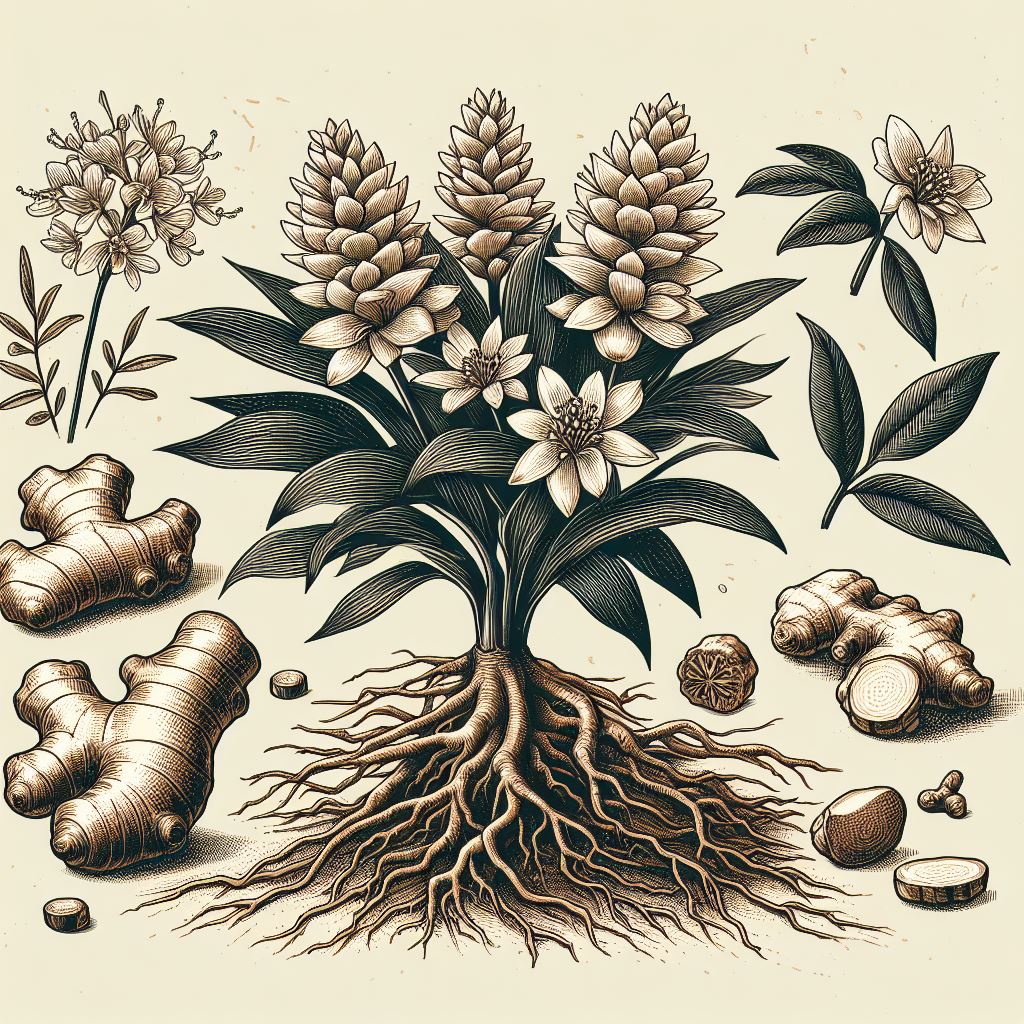
MEDIPLANT | Ginger (Zingiber officinale): A Versatile Spice with Medicinal Properties
Introduction:
Ginger, scientifically known as Zingiber officinale, is a perennial flowering plant belonging to the Zingiberaceae family. Renowned for its distinct aroma, flavor, and medicinal properties, ginger has been used for centuries in traditional medicine systems and culinary practices around the world. In this comprehensive guide, we will explore the botanical characteristics, health benefits, and therapeutic uses of ginger.
Botanical Description:
Ginger is characterized by its rhizomatous root system, from which arise erect stems with lanceolate leaves and cone-shaped inflorescences. The rhizomes, or underground stems, are the part of the plant commonly used in cooking and medicine. Ginger plants thrive in tropical and subtropical climates, with origins traced back to Southeast Asia.
Chemical Composition:
Ginger owes its medicinal properties to its rich array of bioactive compounds, including:
- Gingerols: These phenolic compounds are responsible for ginger’s pungent flavor and possess potent antioxidant and anti-inflammatory properties. Gingerols have been studied for their potential in managing various health conditions, including arthritis and gastrointestinal disorders.
- Shogaols: Formed from the dehydration of gingerols, shogaols exhibit anti-nausea, anti-inflammatory, and anti-cancer effects. They contribute to the therapeutic benefits of ginger, particularly in alleviating nausea and vomiting.
- Zingerone: Another phenolic compound found in ginger, zingerone contributes to its spicy aroma and possesses antioxidant and anti-inflammatory properties. It plays a role in enhancing digestive function and reducing oxidative stress.
- Gingerdiol: Derived from gingerols, gingerdiol exhibits anti-inflammatory and anti-cancer activities, contributing to ginger’s overall medicinal value.
Health Benefits:
Ginger offers a multitude of health benefits, including:
- Digestive Health: Ginger stimulates digestion, promotes gastric motility, and relieves gastrointestinal discomfort such as indigestion, bloating, and nausea. It is commonly used as a natural remedy for digestive issues.
- Anti-inflammatory Effects: The bioactive compounds in ginger, particularly gingerols and shogaols, possess potent anti-inflammatory properties, which may help alleviate pain and inflammation associated with conditions like arthritis and muscle soreness.
- Nausea Relief: Ginger has long been used as a natural remedy for nausea and vomiting, including motion sickness, morning sickness during pregnancy, and chemotherapy-induced nausea. Its anti-nausea effects make it a valuable therapeutic agent.
- Immune Support: Ginger exhibits immune-modulating properties, bolstering the body’s natural defense mechanisms against infections and diseases. Regular consumption of ginger may help strengthen the immune system and reduce the risk of illness.
- Cardiovascular Health: Some studies suggest that ginger may help lower blood pressure, cholesterol levels, and reduce the risk of heart disease. Its anti-inflammatory and antioxidant properties contribute to improved cardiovascular health.
- Antioxidant Protection: Ginger is rich in antioxidants, which help neutralize harmful free radicals and protect cells from oxidative damage. Antioxidants play a crucial role in reducing the risk of chronic diseases and slowing down the aging process.
Therapeutic Uses:
In addition to its culinary uses, ginger is utilized in various forms for therapeutic purposes, including:
- Ginger Tea: A popular home remedy, ginger tea is brewed by steeping fresh or dried ginger in hot water. It is often consumed to alleviate digestive discomfort, soothe sore throats, and promote overall well-being.
- Ginger Supplements: Ginger supplements, available in capsule or tablet form, offer a convenient way to incorporate ginger into one’s daily regimen. They are commonly used for their anti-inflammatory and digestive benefits.
- Topical Preparations: Ginger-infused oils, creams, and ointments are applied topically to alleviate muscle pain, arthritis, and inflammation. Ginger’s warming effect can provide relief from sore muscles and joint stiffness.
- Culinary Uses: Fresh ginger root is a versatile ingredient in cooking, adding flavor and depth to savory and sweet dishes alike. It is used in marinades, stir-fries, soups, curries, baked goods, and beverages, enhancing both taste and nutritional value.
Precautions and Considerations:
While ginger is generally safe for most individuals, it may interact with certain medications and medical conditions. Consultation with a healthcare professional is advised, especially for pregnant or breastfeeding women, individuals with diabetes, and those taking blood-thinning medications or undergoing surgery.
Conclusion:
In conclusion, ginger (Zingiber officinale) is a remarkable plant with a long history of medicinal use and culinary significance. Its bioactive compounds, including gingerols, shogaols, zingerone, and gingerdiol, contribute to its diverse health benefits, ranging from digestive support and anti-inflammatory effects to immune modulation and antioxidant protection. Whether consumed as a spice, brewed into tea, or used topically, ginger offers a natural and effective approach to promoting health and well-being. Embracing the therapeutic potential of ginger can enhance overall vitality and enrich both body and mind.
We give thanks for the images used to:
Stephan H. on Unsplash, Khara Woods on Unsplash, Peter Arnold on Unsplash, Birgitte Heiberg on Unsplash, Pawel Czerwinski on Unsplash







